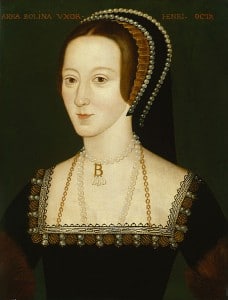 The day after Henry VIII had ordered his Royal Council to recognise Anne Boleyn as Queen, Anne attended Easter Eve mass in the Queen’s closet at Greenwich Palace “with all the pomp of a Queen, clad in cloth of gold, and loaded (carga) with the richest jewels.”1 This was Anne’s first appearance as Queen and was a public statement of her status.
The day after Henry VIII had ordered his Royal Council to recognise Anne Boleyn as Queen, Anne attended Easter Eve mass in the Queen’s closet at Greenwich Palace “with all the pomp of a Queen, clad in cloth of gold, and loaded (carga) with the richest jewels.”1 This was Anne’s first appearance as Queen and was a public statement of her status.
It was her first public appearance as Queen and it was time to make a statement that she was Henry VIII’s rightful wife and Queen.
The imperial ambassador, Eustace Chapuys, reported this event to Emperor Charles V in a letter written on 15th April:
“On Saturday, Easter Eve, dame Anne went to mass in Royal state, loaded with jewels, clothed in a robe of cloth of gold friese. The daughter of the duke of Norfolk, who is affianced to the duke of Richmond, carried her train; and she had in her suite 60 young ladies, and was brought to church, and brought back with the solemnities, or even more, which were used to the Queen. She has changed her name from Marchioness to Queen, and the preachers offered prayers for her by name. All the world is astonished at it for it looks like a dream, and even those who take her part know not whether to laugh or to cry. The King is very watchful of the countenance of the people, and begs the lords to go and visit and make their court to the new Queen, whom he intends to have solemnly crowned after Easter, when he will have feastings and tournaments; and some think that Clarencieux went four days ago to France to invite gentlemen at arms to the tourney, after the example of Francis, who did so at his nuptials. I know not whether this will be before or after, but the King has secretly appointed with the archbishop of Canterbury that of his office, without any other pressure, he shall cite the King as having two wives; and upon this, without summoning the Queen, he will declare that he was at liberty to marry as he has done without waiting for a dispensation or sentence of any kind.”2
The procession to mass sounds like quite a spectacle and must have caused a real stir. You can imagine the whispering and muttering, can’t you?
Chronicler and Windsor Herald Charles Wriothesley also records the event:
“the 12th day of Aprill, Anno Domini 1533, beinge [A.D. 1533.] Easter eaven, Anne Bulleine, Marques of Pembroke, was proclaymed Queene at Greenewych, and ofFred that daie in the Kinges Chappell as Queene of Englande.”3
As does Edward Hall:
“… and so on Easter eve, she went to her closet openly as Quene, with all solemnitie.”4
1533 was a busy spring, with all of the preparations for Anne becoming queen, the annulment of Henry’s first marriage and Anne’s coronation. Just three years later saw another busy spring, but how different it was.
Notes and Sources
- Calendar of State Papers, Venice, iv. 870
- LP vi. 351
- Wriothesley, Charles. A Chronicle of England During the Reign of the Tudors, From A.D. 1485 to 1559, p17
- Hall, Edward. Hall’s Chronicle, p795